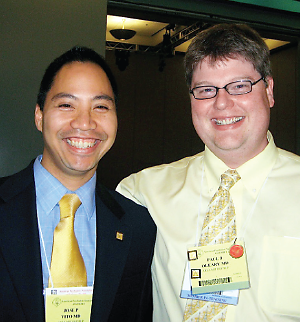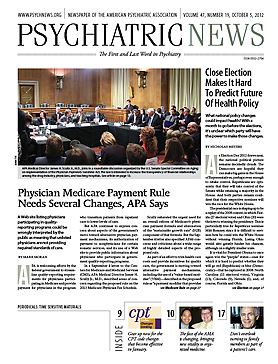“I like to build bridges,” says Birmingham, Ala., psychiatrist Paul O’Leary, M.D., explaining his involvement as a delegate from psychiatry to the Young Physicians Section of the AMA House of Delegates. “I’ve never viewed psychiatry as separate from the rest of medicine, and I think we really help our patients and other physicians when we can educate them about psychiatric illness.”
O’Leary is one of a cadre of young psychiatrists who have energized the AMA with their commitment to organized medicine and helped to build connections between psychiatry and the rest of medicine. And they, along with an influx of young, diverse physicians from other disciplines have transformed the face of the AMA. According to the AMA, the average age of AMA delegates and alternate delegates today is 55.8. In contrast, in 1983 the median age (statistics were unavailable for the average) was 70.
Today nearly 20 percent of AMA delegates and alternate delegates are women, compared with 1983, when 1.8 percent of delegates and 3.0 percent of alternate delegates were women. Moreover, 8.25 percent of AMA delegates and alternate delegates are international medical graduates, compared with 2.5 percent of delegates and 2.6 of alternate delegates in 1983.
The same period has seen the enormous growth in influence of the Section Council on Psychiatry, comprising delegates from APA, the American Academy of Child and Adolescent Psychiatry (AACAP), and the American Academy of Psychiatry and the Law (AAPL). Today, the section council has nine delegates who vote on AMA policy during the AMA House of Delegates meetings in June and November—seven from APA, one from AACAP, and one from AAPL. Additionally, some 30 psychiatrists are members of state delegations from around the country.
Psychiatrists sit on nearly all of the councils that formulate policy for the AMA, and psychiatrist Patrice Harris, M.D., a former member of the APA Board of Trustees, now sits on the AMA board. And in June Jeremy Lazarus, M.D., was inaugurated as the third psychiatrist to be president of the AMA (see Lazarus Discusses AMA Priorities and Psychiatric News, July 20). (For a description of areas in which AMA support of psychiatry has been influential, see AMA and Psychiatry Stronger Together).
O’Leary first became involved in the AMA as a resident when he was selected by the APA Assembly to be a member-in-training representative to the House of Delegates from psychiatry.
Today, he is APA’s early career representative to the Young Physicians Section. And he is using his role as a specialty-society representative to build bridges with other physicians from his state in the Medical Association of the State of Alabama (MASA).
“At the AMA I feel like I can act as an ambassador for psychiatry,” he told Psychiatric News.
Back at home, O’Leary, a forensic psychiatrist, has been building bridges between the community and legal and health care systems in Atlanta. (O’Leary commutes once a week from his home in Birmingham to Atlanta, two hours away by car.) Along with his mentor, Peter Ash, M.D., of Emory University, O’Leary helped pilot the “Competency Restoration Project” at the Fulton County Jail.
“It is the largest jail in Atlanta and has a significant population of inmates with mental illness,” he explained. “Sometime the severity of the mental illness prevents the inmates from working with their attorney, understanding their situation, or understanding the roles of the people in the court. If inmates are unable to do any of these, then they are deemed incompetent to stand trial (IST), and their competency has to be restored prior to going to trial.”
Some individuals deemed IST were required to wait in jail, sometimes for many months, before being admitted to the state forensic hospital for treatment to restore them to competency; while in jail, they may or may not have received medication and would not have received additional treatment focused on restoring their competency.
In some cases, individuals languish in jail for minor nonviolent crimes. “We had an individual who was delusional and thought a particular abandoned house was his residence,” O’Leary said. “He kept returning to it and was finally arrested by the police. If competent, he could have worked with an attorney to plea down the sentence and been out in a couple months. But as he was incompetent, he spent almost a year waiting to go to the state hospital then spent another year in the hospital, being restored to competency.
“As the number of inmates with mental illness continues to grow, I have seen that services bridging the legal, community, and health care systems are a must,” he said.
So O’Leary and Ash led a project that selects the inmates who are IST and supplements their psychiatric treatment in jail, focusing on quickly restoring competency. “The project started almost a year ago,” O’Leary said. “Since that time, we have significantly reduced the number of Fulton County inmates waiting for a bed at the state hospital. Our program includes daily classes and education on legal issues, medication, and healthy living. We have weekly medication clinics to monitor medication adherence and encourage inmates to take their medications. We don’t force medication, but use encouragement and our therapeutic alliance.
“As the project has continued, we are developing additional ties with the public defenders, judges, and community in an attempt to help develop treatment plans that not only help restore competency, but assist in reducing recidivism once out of the jail.”
O’Leary knows that community activism of this kind, and that of his colleagues from the AMA in other communities, is dependent on—and sometimes influenced by, for better and worse—policies and protocols formulated by lawmakers who may not always have the interests of patients and physicians in mind. And so his involvement in the AMA—as well as in APA and his state medical society—is the logical extension of his work as a psychiatrist.
“I have always been interested in rules and laws and statutes that govern how medicine is practiced, and it is really groups like APA, the AMA, and MASA that help to determine how those rules, which might otherwise be detrimental to patients and physicians, are written,” O’Leary said. “For me that is the importance of involvement in organized medicine. Groups like these look out for the best interests of our patients and our profession.”

AMA and Psychiatry Stronger Together
The following are areas in which the AMA has approved policies beneficial to psychiatrists:
Medicare Payment Reform: The AMA has consistently demanded reform of the formula by which physicians are paid under Medicare, and every year has been instrumental in blocking increasingly severe across-the-board cuts in Medicare payment, mandated by the formula. The AMA has also called for an option that would allow Medicare patients to contract privately with their physician (Psychiatric News, July 16, 2010).
Mental Health Parity: The AMA has a long record of support for mental health and substance abuse parity, going back to the AMA’s membership in the APA-led Coalition for Fairness in Mental Health Coverage formed in the 1990s (Psychiatric News, November 8, 2008).
Health Care Reform: The AMA has a policy articulating its own vision for health care reform emphasizing individual ownership of insurance, insurance market reforms, and tax credits and federal subsidies to expand insurance coverage. Though opposed to some aspects of the Patient Protection and Affordable Care Act, the AMA provided crucial support for the health care reform law, including support for the “individual mandate.” At the AMA’s 2009 Annual Meeting, the AMA House of Delegates approved policy asserting that parity is an essential component of health care reform (Psychiatric News, July 19, 2009).
Scope of Practice: In 2005, five state medical executives and five specialty society executives—including APA Medical Director James H. Scully Jr., M.D.—formed the Scope of Practice Partnership (SOPP), which now includes 50 state medical societies, 25 national specialty societies, and the American Osteopathic Association. The SOPP advises the AMA and state and medical specialty societies about scope-of-practice issues, including options for litigation.
Public Health: The AMA’s Council on Science and Public Health (CSPH) has been the source of many resource documents important to psychiatry. At this year’s Interim Meeting in November, the council will issue a report on use of atypical antipsychotic medications in children. Past CSPH reports have addressed video games and potential for violence, physician and physician-in-training suicide, blood lead levels in children and relationship to behavioral problems, and violence in hospital emergency departments (Psychiatric News, December 17, 2010).
Miscellaneous: The AMA has approved policy on the shortage of psychiatric inpatient beds (Psychiatric News, July 20, 2007), the designation of “intellectual disability” as an underserved category (Psychiatric News, December 16, 2011), the shortage of child psychiatrists (Psychiatric News, July 16, 2010); administrative burdens placed on physicians using medications with black-box warnings for off-label purposes (Psychiatric News, December 16, 2011), and state laws restricting physicians’ rights to inquire about guns in a patient’s home (Psychiatric News, July 15, 2011).

